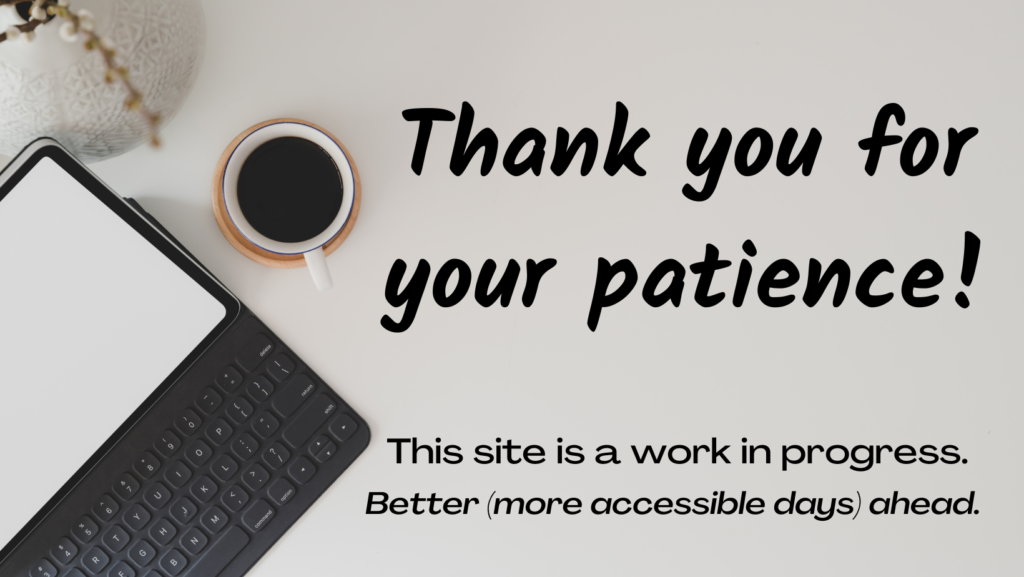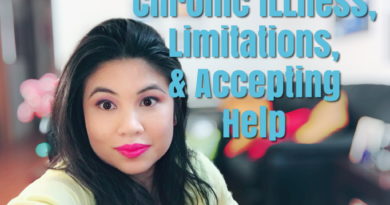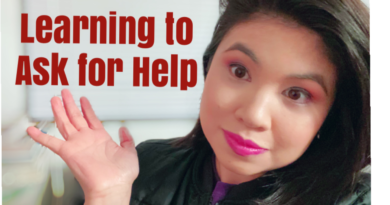Thank you for your patience! Growing Pains
As I hinted at in my last blog post, I am trying to make this website more disability accessible and in the process, ironically, this will cause some problems in the interim. The website still works but probably looks a little “wonky.” I apologize…Below you will find resources for requesting ADA accommodations in healthcare settings and not losing your (Medicaid) coverage now that the Public Health Emergency was declared over in May.

Being a Patient is a Full-Time Job
I have no software development background. I started this website from scratch in 2012 and it’s hard to keep up with the constant changes in WordPress between doctors appointments, homework, my job, and my healthcare advocacy work. I wish I could accomplish these changes faster. I do add alt text to my social media posts (Twitter, Instagram, official Facebook page of this blog, LinkedIn, etc) and have been adding them to images on this blog for some time, but completely overhauling this blog is much harder. Often, the biggest challenge is not the 24/7 fatigue nor the chronic pain that comes with illness but the paperwork that comes with being a patient. Being disabled means dealing with excessive paperwork! Please excuse these growing pains as you navigate my website.
If I could afford it, I would hire an assistant to expedite the process of updating this website to universal design. But alas, that’s not an option for me. Disabled people and patients must deal with: paperwork to get insurance, paperwork to stay covered, paperwork to get accommodations at school or work, and paperwork to access medications that our doctors have already prescribed (AKA “prior authorization” which has become the bane of my existence), and more. Doctors actually spend one third of their time at appointments filling out paperwork! They are just as annoyed by prior authorizations as we are. There are weeks where I have spent one half of my conscious hours trying to access (prescribed!) medications. And now, with the lifting of virtually all COVID mitigations in healthcare settings (mask mandates, vaccine mandates among healthcare workers, COVID testing of patients, etc), that too has created more paperwork.
Requesting ADA Accommodations in the Hospital (Masking): Resource
Last week, I had a planned inpatient hospital stay and had to request an ADA accommodation so that the healthcare workers treating me would wear N95 masks. I myself could not wear any mask and didn’t want the people touching me to be unmasked. For advice on how to make such an accommodation, HERE is advice from the People’s CDC. I used their language and won the accommodation. (I did not get COVID in the hospital per the PCR test I took 5 full days after potential exposure–when I left the hospital. Even though I had zero symptoms, I still tested because I understand asymptomatic transmission and wanted to protect myself and others.) You may have a condition (or multiple conditions) that is on the CDC’s list of underlying medical conditions that puts you at higher risk for “severe” COVID outcomes; see the list HERE. If so, it will be less difficult to obtain an ADA accommodation using the legal language People’s CDC recommends, which I followed.
Unfortunately, I am not a lawyer! Disclaimer: This (what I am saying on this blog) is not legal (or medical) advice. If you experience resistance when asking for an accommodation, your state (I am referring to the United States) may have a civil Legal Aid Society; these societies provide free legal representation to low-income individuals. I wish I could give you more information specific to your location but this country has convoluted systems that increase the administrative burden for people with disabilities and/or serious health conditions.
Don’t Lose Your Medicaid Coverage
My organization, ACA Consumer Advocacy, previously hosted a webinar–“Let’s Talk Unwinding & How to Stay Covered”–on how not to lose your coverage now that the Public Health Emergency (PHE) has ended, which I promoted on this blog. Already in Florida, the end of the PHE last month has resulted in 250,000 Americans losing their Medicaid coverage. As someone on Medicaid, I too am impacted by the end of PHE and now have more paperwork to fill out to keep my healthcare. You can watch ACA Consumer Advocacy’s webinar below to learn how not to lose your coverage:
Thank you for your patience! And thank you for being with me on this journey for the past 11 years. June 9 was the 11th anniversary of Fashionably ill ®.
–Jessica




